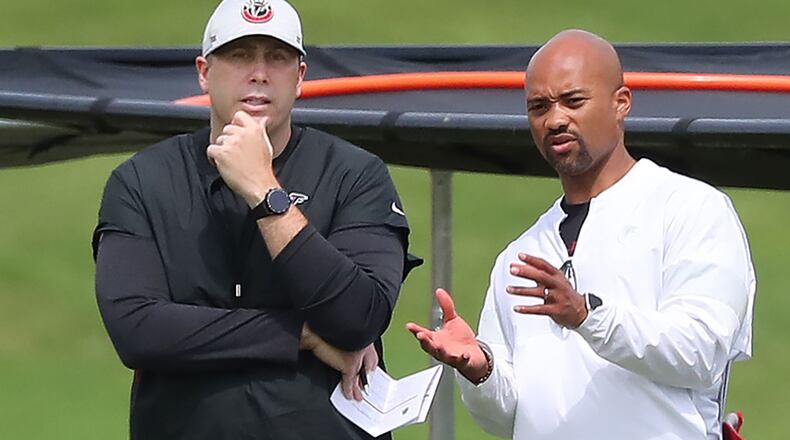FLOWERY BRANCH — When the new regime of general manager Terry Fontenot and coach Arthur Smith were hired in January 2021, the Falcons were up against the salary cap.
After being playoff contenders, former general manager Thomas Dimitroff and coach Dan Quinn, had to extend Matt Ryan’s contract, attempt to placate wide receiver Julio Jones and try to retain some of the young defenders such as Deion Jones and Keanu Neal, who helped the team reach Super Bowl 51.
It wasn’t necessarily salary-cap hell if the players fit the new regime’s “makeup.” But new regime sensed there were some entitlement issues from some of Dan Quinn’s band of “The Brotherhood” group.
So, they immediately starting moving them out, starting with Julio Jones in 2021 and ending with Deion Jones in a trade to Cleveland last season.
Of course, the biggest move was trading Matt Ryan to Indianapolis and deciding to eat an NFL-record $88 million in dead salary-cap space last season after losing the Deshaun Watson sweepstakes to Cleveland.
With the books finally cleared, the Falcons spent over $130 million to revamp their defense in the recent offseason. Safety Jessie Bates III was the main benefactor in the form of a four-year, $64.02 million deal.
“It’s part of it,” Bates told The Atlanta Journal-Constitution about playing on the franchise tag his last season with the Bengals. “It was tough. Mentally, you try to think about what you want as far as a deal and stuff like that. Overall, I think it’s definitely a weight off my shoulders just to be able to play ball and focus on the team.”
After two seasons of getting by with a lot of players on one-year contracts, the Falcons finally could add some talent.
“It allows you to have a lot more flexibility,” Smith said about finally have some salary-cap space.
Here’s a look at the key moves that accelerated the descent into salary-cap hell and then returned the Falcons to financial viability:
Move 1. Julio Jones, perhaps miffed by Ryan’s five-year, $150 million extension, kept complaining about his contract. He held out and had his deal redone twice.
The new regime didn’t need a disgruntled Jones around to thwart their rebuilding plans from the start.
Jones was traded to Tennessee in 2021 for a second-round pick, a fourth-round pick and a sixth-round pick, but what the Falcons really received was some initial salary-cap space.
By trading Jones after June 1 that year, the Falcons were allowed to split his dead-cap charge over two seasons and created $15.3 million in salary-cap space. The space gave them space to sign their first rookie class.
The Titans took on all of the Jones’ contract (with cap numbers of $15.3 million in 2021 and $19.263 million in ‘22 and 23) without any contribution from the Falcons.
Jones played 10 games for the Titans and caught 31 passes in 2021. He played 10 games for the Bucs and caught 24 passes last season. He has not been signed for this season, and if he retires, his five-year clock for enshrinement in the Pro Football Hall of Fame will start.
Move 2. The new regime tried to salvage a bad deal the Falcons signed with outside linebacker Dante Fowler and had him take a pay cut in 2021.
Fowler signed to a three-year, $45 million deal in 2020, with $29 million guaranteed. Fowler’s contract was renegotiated March 17, 2021, which lowered his salary-cap number from $18.5 million to $10.6 million for 2021, with $6 million base salary guaranteed, according to NFLPA documents. He could have earned $4 million more if he reached 11 sacks. He finished with only 4.5 sacks.
He was released in February 2022, and the Falcons were left with $4.6 million in dead salary-cap space.
Move 3. The Falcons attempted to sign former Gainesville High and Clemson star Watson in free agency after the 2021 season.
Cleveland won the derby for Watson, who was mired in a widespread sexual misconduct and harassment situation that led to a league suspension.
After the Falcons’ flirtation with Watson, Ryan wanted out, and the team accommodated him with a trade to the Colts for a third-round pick.
After moving on from Ryan, the Falcons signed Marcus Mariota and drafted Desmond Ridder in the third round (74th overall) of the 2022 draft out of Cincinnati.
Move 4. The Falcons restructured Deion Jones’ contract and traded him to Cleveland last season.
Now, with the deck cleared of most of the old regime’s contracts, the Falcons were about to see some daylight. They would have the second most money to spend for 2023 free agents, trailing only the Chicago Bears.
Move 5. There was one final move, and that was to get rid of Mariota’s contract after he arguably quit on the team after being benched. He was a place-holder, and the Falcons added $12 million in salary-cap space when he was released in February.
The Bow Tie Chronicles
About the Author
Keep Reading
The Latest
Featured


